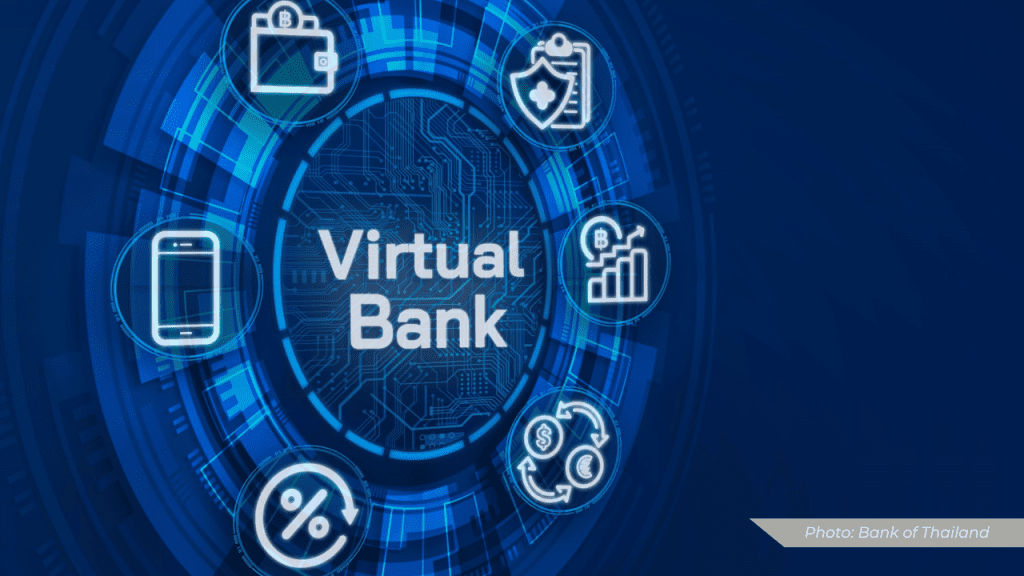How will virtual banks affect a financial market where depositors are unhappy with low interest rates from commercial banks and borrowers are worried about higher lending rates?
In Thailand, the gap between interest rates at banks is bigger than in Malaysia and Singapore.
The concept of a virtual bank
Virtual banks will only operate digitally, without physical branches, giving them a cost advantage over traditional banks that require office space.
Utilizing digital technology will reduce staffing costs, but virtual banks may not offer the same personal touch as traditional banks, making them more suitable for consumer lending than corporate clients.
Initially, the Bank of Thailand (BOT) planned to issue only three licenses for virtual banks, but later the central bank and the Finance Ministry announced the number would not be limited to three.
Authorities have set seven critical conditions for virtual banks: the ability to conduct business, proper use of extensive information, proficiency in using technology for digital channel service, robust technology and security, knowledgeable executives and applicants, financial business management ability and risk culture, and strong capital and shareholder support.
Applications will be accepted from March 20 to September 19.
Several local business groups have shown interest in obtaining a license. Gulf Energy Development Pcl, in collaboration with AIS and Krungthai Bank, is the first to apply with a proposed registered capital of 5 billion baht.
Other interested parties include a consortium led by SCB X Pcl, the parent company of Siam Commercial Bank, along with China’s digital WeBank and South Korea's KaKoaBank. Another potential bidder is the Charoen Pokphand Group.
A disruption in the banking industry
Anusorn Tamajai, an economics lecturer at the University of the Thai Chamber of Commerce (UTCC), was positive about the introduction of virtual banks. He stated it would disrupt traditional banks, leading to job cuts, branch closures, and pressure to offer more competitive interest rates and lower fees.
Anusorn, a former BOT board member, mentioned that bank customers, especially small and medium-sized enterprises [SMEs] and retail customers, would have more service options.
Ultimately, banks would experience reduced revenue and less dominance in the Thai banking system due to competition from virtual banks, leading to decentralization.
The emergence of virtual banks would also alter the role of the BOT, especially in banking supervision, according to Anusorn.
The BOT's main responsibility now is to issue the appropriate number of licenses to introduce healthy competition and ensure financial market stability.
A properly functioning financial system that effectively uses money would enhance Thailand’s economic growth, he said.
A less developed financial market was one of the reasons why Thailand became stuck in a middle-income trap, he added.
Virtual banking overseas
Online banks in other countries have had varying degrees of success. For example, WeBank in China has more than 100 million customers, while Starling Bank and Atom Bank in the United Kingdom have millions of customers.
Current, a financial technology company part of Choice Financial Group, and Vora Bank in the United States have successfully raised over US$2 billion for lending. N26, a virtual bank in Germany, could offer innovative financial services to 7 million customers.
Kakao Bank in South Korea has 17 million clients, according to Anusorn.
Tech powerhouse Apple has partnered with Goldman Sachs, a leading financial group in the US, to create a fintech giant. Apple provides both its credit card and savings account services through the wallet app on iPhones, while Goldman Sachs manages the banking back-end.
By 2030, it's estimated that more than 8 billion people – about 90 percent of the global population – will have access to the Internet.
Currently, there are 5 billion internet users. Having more users would increase the potential for digital financial services.
Anusorn predicts a decentralization of the financial system with alternative forms of currency like cryptocurrency or privately issued money. This would diminish the role of the central bank, as cryptocurrency would rival traditional fiat money.
Central banks worldwide are contemplating issuing their own retail digital currencies.
The main factor for a virtual bank to be successful is considered to be cybersecurity, which affects customer confidence. Criminals have often taken advantage of bank customers’ lack of knowledge about various financial scams through internet banking.
By Thai PBS World’s Business Desk
What impact can virtual banks have on a financial market where depositors are dissatisfied with the low interest rates offered by commercial banks while borrowers are worried about higher…









